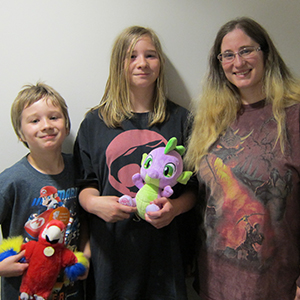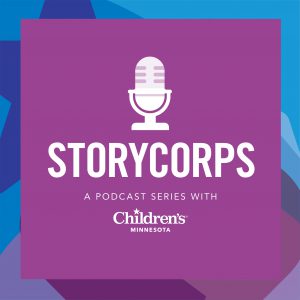Hemophilia: Jessica and Dusty’s story


About this episode
Mostly about Jessica’s journey from her father having hemophilia and dying of it and how hemophilia has changed. Her son, Dusty, discusses how he knows his limits and helps set up infusion kits. A beautiful and rich interview.
Topics covered:
- Diagnosis: Past family history
- Support: Hospital and clinic
- Treatment: Advice and messages
Transcript
Jessica: I just had this overwhelming feeling of joy seeing them and being a mother for the first time and seeing Dusty, how tiny he was. I don’t know. It’s just amazing. when they first gave him to me the first time, to me he felt like a little porcelain doll, because he was just so small. But it was about the third day in the hospital I found out that he actually had it, and to tell you the truth, it crushed my world, because I was really hoping that he wouldn’t have it, but…and I literally screamed when I found out. Yeah, my father was a hemophiliac. And I already knew that I was a carrier for it, but like I said, I was trying to look on the other side of it, because in my family there were a couple of his brothers and sisters that didn’t have the being a carrier, or having it themselves, so I looked at it that way, but it didn’t work out. It really was a downer when I found out. My father passed on when I was nine, so the whole thing with hemophilia fell out of my life for at least a good ten to fifteen years. Until my son Dusty was born. It was hard at first but I would never give him up for anything. I mean he’s my world, and I love him to death and I would do anything for him.
Dusty: That basically if you’re a hemophiliac be careful. I get it now on Mondays and Thursdays.
Jocelyn (pediatric nurse practitioner): Who gives it to you?
Dusty: We see um, my nurse.
Jocelyn: What does it feel like when they do it? Does it hurt or not?
Dusty: Only sometimes it hurts, but not all the time.
Jocelyn: Do they put medicine on so it doesn’t hurt?
Dusty: No.
Jocelyn: Oh, they just do it?
Dusty: Yeah.
Jocelyn: That’s interesting. Do you help with it at all?
Dusty: Um, I get things ready.
Jocelyn: What do you put out?
Dusty: I get basically everything.
Jocelyn: Oh, good for you.
Jessica: Yeah, he helps build the kits up before the nurse shows up.
Dusty: Yeah.
Jessica: Dusty, what type of advice would you give to other kids with your blood disorder?
Dusty: Make sure you be careful around sharp stuff, things that are hard, or like things that could hurt you.
Jessica: Yes, you need to know your limits, too.
Dusty: The hardest thing about having hemophilia is that I can’t do a lot of sports.
Jessica: They’re like normal kids, really. I mean seeing Dusty you can’t even tell that he’s a hemophiliac, and all, and I just let them play and have fun. I treat them like little adults, really. It was about the fifth day when we got out of the hospital and we got to go up to Children’s Hospital and learn about all of the breakthroughs that have happened since back in the 80’s that’s a little of what I remember because I would take my dad down to the ED in Mankato where he would get his factor at. Seeing the difference from what he had to do to what Dusty has to do today there has been a really big breakthrough on how it’s all done. With my dad, he had to be careful on what he did because he was a severe hemophiliac he was on crutches because when he was a child he fell off of a horse, broke his leg and it didn’t heal right he ended up being on crutches for the rest of his life. He would get his infusions about every other day he would go to the ER to have it done, he would take a huge needle and slowly do it himself and I would just sit and talk with him. Other than that he would play with me a lot, our version of playing catch he would be sitting somewhere and we would be throwing the ball back and forth we would go for car rides. I got to learn a little bit about it, but being so young, you don’t really care so much about it.
Jocelyn: How has the hemophilia changed? I mean it sounds like it’s very different now.
Jessica: The way they do the infusions, I mean it’s not done with human blood anymore so that way you don’t pass on other diseases and so fourth. Dusty having the port, that was new. I know how to access it and I have Prairie River Home Care come out when I used to do it when he was really young he’d go off and scream and cry and everything it just got to a point with me where I have to have help because I’m saving my child but I’m hurting him at the same time. It came to the point where he was practically begging me not to do it. Because like I said, I infused him in the beginning but when he literally had tears in his eyes going “please mommy don’t” I couldn’t anymore. So that’s when I called Prairie River and they were more than willing to help out on that. It gets overwhelming so they come out twice a week.
He’s gotten a lot older now so it’s gotten to the point where he very rarely has any of that numbing cream on when he’s getting it done. I mean it’s brought us a lot closer as a family to really understand everything. I mean I don’t wish this for anybody but that’s life, these are the cards that you are dealt with and you play them. There’s lots of support between Children’s and the U of M [University of Minnesota] I wish my hospital in Mankato was more like that, but they’re not. I’ve literally had to explain to them how to put the kits together, how to infuse him. And when I bring the factor in, he needs it right away, instead they wait two to three hours and then go “oh we should probably give this to him” after me and my husband have been telling them constantly he needs this. There’s been times where I’ve literally begged Dr. Kurth if she could send some nurses or something to help educate our hospital about it because it’s one of those rare disorders that nobody learns about.
For the health care professionals: I would really say, learn about your patient let them tell their side of the story what they feel the pains they are going through. Not everybody is a textbook person. I’m not really great at giving advice but all I can say is just keep loving your children like any other child, they gotta expand, let them explore just like everyone else. Always tell them that that you’ll be there for them if you need to be and they will love you for it.
We wish to extend our thanks to the families who have shared their story here about the impact of living with hemophilia and sickle cell disease. We would also like to thank the many who worked on this project:
The Children’s Minnesota StoryCorps Legacy Team:
Eddie Gonzalez, Jocelyn Bessette Gorlin, Susan Kearney, Stephen Nelson, Margaret Heisel-Kurth, Stephanie Davis, Angela Blue, Elizabeth McDonough, Jill Swenson and Alisa Linne.
Special thanks to:
Stephanie Moua, Hamdi Hussein, Sadia Farah, Fatima Ali, Caillyn Costello, Suzanne Lehman, Suzan Ulrich, D'Ann Urbaniak Lesch, Justin Nelson, Allison Albright, Marvin Holmes-Leopold, Jose Rodriguez and Mitch Hare.
Minneapolis Institute for Production and Recording:
Jose Rodriguez and Mitch Hare.